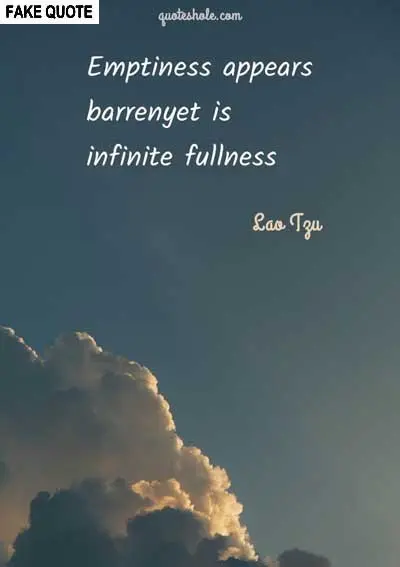|
Tao Te Ching
THE TAOISM OF LAO TZU
|
Fake Lao Tzu Quote"Emptiness appears barren..."
This is NOT a quote from Tao Te Ching:"Emptiness appears barren, yet is infinite fullness"
This is a strange saying. The first part would work just as well reversed: barrenness appears empty. Of course, emptiness does not have the exact same meaning as barrenness. The former is an absolute, where the latter is somewhat relative — it can mean that something is missing, but something else is there. So, if the former is intended, the barren of the saying must be replaced by something as absolute, like void or for that matter empty. What is said is really just that emptiness appears empty. The problem with 'infinite fullness' is similar. If it's full, it's full, otherwise not full. Adding "infinite" makes no difference. The word implies that the fullness goes beyond the space it fills, and that would just be expanding that space endlessly — like our universe, which is anything but empty. Whatever space is intended in the quote, it's either full or not full of whatever is filling it. Finite fullness would make more sense, or just fullness. Thus, for example: Emptiness appears empty, yet is full. Yes, full of emptiness, in the sense that there is no part of it that is not empty.
To make sense of it when compared to other versions, it is necessary to reflect on the first few lines of that chapter. Girling's version reads (page 61):
That full and perfect thing of which Lao Tzu spoke is Tao, the Way. To him, it was the driving principle of the whole world, and although as hard to see as if hidden, it never stopped and never failed. Lao Tzu more than once used the paradox of this the mightiest force seeming the vaguest. For example, chapter 4 states (my version):
The Taoist Master's name is not mentioned, nor anything about Girling's own background, academic or other. The bibliography in Girling's book contains 25 Tao Te Ching versions (pages 123-125), esteemed ones as well as some less trustworthy. Still, checking through the interpretations of some of the other chapters, I wonder with what intention the author has consulted all those versions. The same year as the above mentioned book, Girling released Tao Te Ching: with Comparative Quotes from Aristotle to Zhuangzi, which has more than twice the number of pages. I would be surprised if this were not the first manuscript. In it, each chapter of Tao Te Ching is followed by Girling's comments and quotes from a wide variety of thinkers. That is a splendid idea, provided that the versions of the Tao Te Ching chapters are trustworthy. I have my doubts about that.
Stefan Stenudd September 14, 2020.
More Fake Lao Tzu QuotesThere are many more fake Lao Tzu quotes examined on this website. Click the header to see a list of them.
Fake interview with the authorClick the header to read a "fake" interview with Stefan Stenudd, the author of Fake Lao Tzu Quotes.
About CookiesMy Other Websites:I Ching OnlineThe 64 hexagrams of the Chinese classic I Ching and what they mean in divination. Try it online for free.
Qi Energy ExercisesThe ancient Chinese life energy qi (chi) explained, with simple instructions on how to exercise it.
Life EnergyThe many ancient and modern life force beliefs all over the world explained and compared.
Taoismen på svenska
Other Books by Stefan StenuddClick the image to see the book at Amazon (paid link).
The Greek philosophers and what they thought about cosmology, myth, and the gods. |
 Tao Te Ching
Tao Te Ching Now it's a book, too!
Now it's a book, too! Tao Quotes
Tao Quotes Cosmos of the Ancients
Cosmos of the Ancients Qi — Increase Your Life Energy
Qi — Increase Your Life Energy Aikido Principles
Aikido Principles Life Energy Encyclopedia
Life Energy Encyclopedia Archetypes of Mythology
Archetypes of Mythology Stefan Stenudd
Stefan Stenudd